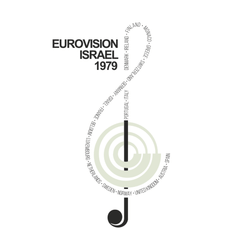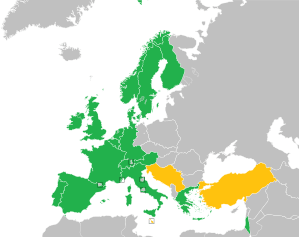Eurovision Song Contest 1979
The Eurovision Song Contest 1979 was the 24th edition of the annual Eurovision Song Contest. It was held on 31 March 1979 in Jerusalem, Israel, following the country's win at the 1978 edition. The event was staged at the International Convention Center. The presenters were Daniel Pe'er and Yardena Arazi. Nineteen out of the twenty countries that participated in 1978 also participated, with the exception of Turkey, which withdrew after Arab countries pressured into not participating in Israel.[1]
| Eurovision Song Contest 1979 | |
|---|---|
 | |
| Dates | |
| Final | 31 March 1979 |
| Host | |
| Venue | Ussishkin Auditorium at the International Convention Center Jerusalem, Israel |
| Presenter(s) | Daniel Pe'er Yardena Arazi |
| Conductor | Izhak Graziani |
| Directed by | Yossi Zemach |
| Executive supervisor | Frank Naef |
| Executive producer | Alex Gilady |
| Host broadcaster | Israeli Broadcasting Authority (IBA) |
| Interval act | Shalom '79 (Peace '79) |
| Website | eurovision |
| Participants | |
| Number of entries | 19 |
| Debuting countries | None |
| Returning countries | None |
| Non-returning countries | |
Participation map
| |
| Vote | |
| Voting system | Each country awarded 12, 10, 8–1 point(s) to their 10 favourite songs |
| Nul points | None |
| Winning song | "Hallelujah" |
The winner was Israel with the song "Hallelujah", performed by Milk and Honey. Yugoslavia, who missed the 1978 Contest, also didn't want to take part nor transmit the 1979 show for political reasons. As well as being broadcast live in the 19 competing countries, the contest was broadcast in Turkey, Romania, Hong Kong and Iceland.
Location
Jerusalem is one of the oldest cities in the world. In the ancient cuneiform, Jerusalem was called "Urusalima", meaning "City of Peace", during the early Canaanite period (approximately 2400 BC).[2] It is considered holy to the three major Abrahamic religions—Judaism, Christianity and Islam.
Format
The stage concept designed by Dov Ben David, inside the stage there is an moving symbol which based on Israeli Broadcast Authority logo. (which was built like a lamp with 3 concentric rings) using a small projected model.[3]
Each country had a jury who awarded 12, 10, 8, 7, 6, 5, 4, 3, 2, 1 point(s) for their top ten songs. This was the last year in which the points were announced via order of appearance, as opposed to order of preference.
The voting was extremely close. Israel gained a good lead in the early stages of the voting, but Spain eventually caught up and took a good lead themselves. At the close of the penultimate jury's votes, Israel were one point behind Spain, and only the Spanish jury had yet to give their votes. Spain ended up giving Israel 10 points, causing the crowd to erupt into enormous cheers.
Participating countries
At one point before the contest Turkey was going to participate. The country would have appeared 11th on stage (between Israel and France), represented by Maria Rita Epik and 21. Peron with the song "Seviyorum" ("I'm Loving"). However Turkey was forced to retire from the contest under pressure from Arab states who objected to a predominantly Muslim country taking part in a contest held in Israel.[4]
Returning artists
The contest saw the return of four artists who had participated in previous editions of the contest: France's representative Anne-Marie David was the winner for Luxembourg in 1973, Netherlands' Xandra represented the country in 1972 and 1976, Norway's Anita Skorgan represented the country in 1977, and Switzerland's Peter, Sue and Marc represented the country in 1971 and 1976.
Conductors
For each nation's performance, the orchestra was conducted by the following:











.svg.png)






.svg.png)
Had Turkey not withdrawn, their entry would have been conducted by Tuğrul Karataş.[5]
Results
The following tables reflect the confirmed, verified scores, which were adjusted after the live broadcast. During the voting announcement, due to a misunderstanding by the presenter Yardena Arazi, Spain appeared to award 10 points to both Portugal and Israel and these scores were added to the scoreboard. After the programme, verification confirmed that Portugal should only have received six points, leaving the total Portuguese score reduced by four points to 64.
Scoreboard
| Results | ||||||||||||||||||||||
|---|---|---|---|---|---|---|---|---|---|---|---|---|---|---|---|---|---|---|---|---|---|---|
| Portugal | 64 | 6 | 2 | 5 | 4 | 4 | 10 | 5 | 3 | 3 | 3 | 6 | 7 | 6 | ||||||||
| Italy | 27 | 8 | 8 | 3 | 8 | |||||||||||||||||
| Denmark | 76 | 2 | 3 | 12 | 1 | 10 | 12 | 6 | 7 | 4 | 8 | 1 | 3 | 3 | 4 | |||||||
| Ireland | 80 | 5 | 5 | 5 | 6 | 10 | 6 | 6 | 3 | 10 | 7 | 8 | 5 | 4 | ||||||||
| Finland | 38 | 7 | 7 | 8 | 5 | 5 | 6 | |||||||||||||||
| Monaco | 12 | 1 | 2 | 4 | 3 | 2 | ||||||||||||||||
| Greece | 69 | 10 | 1 | 4 | 7 | 7 | 2 | 10 | 4 | 1 | 5 | 7 | 2 | 2 | 7 | |||||||
| Switzerland | 60 | 7 | 1 | 10 | 2 | 2 | 7 | 4 | 7 | 8 | 12 | |||||||||||
| Germany | 86 | 2 | 1 | 12 | 5 | 3 | 12 | 6 | 12 | 4 | 1 | 2 | 6 | 8 | 12 | |||||||
| Israel | 125 | 12 | 6 | 12 | 12 | 8 | 4 | 5 | 1 | 2 | 8 | 1 | 12 | 12 | 12 | 8 | 10 | |||||
| France | 106 | 6 | 10 | 1 | 10 | 8 | 10 | 5 | 6 | 12 | 12 | 5 | 7 | 6 | 5 | 3 | ||||||
| Belgium | 5 | 2 | 1 | 2 | ||||||||||||||||||
| Luxembourg | 44 | 7 | 3 | 4 | 4 | 5 | 3 | 2 | 4 | 2 | 10 | |||||||||||
| Netherlands | 51 | 8 | 10 | 5 | 3 | 3 | 7 | 3 | 4 | 4 | 4 | |||||||||||
| Sweden | 8 | 6 | 1 | 1 | ||||||||||||||||||
| Norway | 57 | 3 | 3 | 8 | 6 | 2 | 8 | 2 | 6 | 10 | 7 | 1 | 1 | |||||||||
| United Kingdom | 73 | 4 | 8 | 10 | 7 | 7 | 1 | 2 | 8 | 5 | 10 | 6 | 5 | |||||||||
| Austria | 5 | 4 | 1 | |||||||||||||||||||
| Spain | 116 | 12 | 3 | 6 | 12 | 12 | 8 | 8 | 12 | 10 | 10 | 7 | 1 | 5 | 10 | |||||||
| The table is ordered by appearance | ||||||||||||||||||||||
12 points
Below is a summary of all 12 points in the final:
| N. | Contestant | Voting nation |
|---|---|---|
| 6 | Israel | Finland, Ireland, Norway, Portugal, Sweden, United Kingdom |
| 4 | Germany | Denmark, France, Monaco, Spain |
| Spain | Belgium, Germany, Italy, Switzerland | |
| 2 | Denmark | Greece, Israel |
| France | Luxembourg, Netherlands | |
| 1 | Switzerland | Austria |
International broadcasts and voting
Voting and spokespersons











.svg.png)






.svg.png)
Commentators
Participating countries











.svg.png)






.svg.png)
Non-participating countries
.svg.png)

.svg.png)

.svg.png)
References
- "Jerusalem 1979". Eurovision.tv.
- BC The Archaeology of the Bible Lands by Magnus Magnusson. BBC Publications London. 1977.
- "An interview with Dov Ben David on the preparations for the Eurovision in Jerusalem". Retrieved June 17, 2020.
- O'Connor, John Kennedy. The Eurovision Song Contest: The Official History. Carlton Books, UK. 2007 ISBN 978-1-84442-994-3
- http://eurovisionartists.nl/index.htm?content/esf540.asp?ID=13
- "Eurovision Song Contest 1979". The Diggiloo Thrush. Retrieved 4 March 2012.
- "Comentadores Do ESC – escportugalforum.pt.vu | o forum eurovisivo português". 21595.activeboard.com. Archived from the original on April 21, 2012. Retrieved 2012-08-10.
- "Selostajat ja taustalaulajat läpi vuosien? • Viisukuppila". Viisukuppila.fi. Retrieved 2012-08-10.
- Baumann, Peter Ramón (OGAE Switzerland)
- "Eurovision Song Contest 1979". Ecgermany.de. Retrieved 2012-08-10.
- "פורום אירוויזיון". Sf.tapuz.co.il. 1999-09-13. Archived from the original on October 8, 2011. Retrieved 2012-08-10.
- "Hallelujah: het goede liedje op de goede plaats op de goede tijd, Leidse Courant, 2 April 1979
- "Infosajten.com". Infosajten.com. Archived from the original on July 18, 2012. Retrieved 2012-08-10.
- Dyrseth, Seppo (OGAE Norway)
- "Aleluia, venceu o balão de Israel", Diário de Lisboa, 2 April 1979
- "Forside". esconnet.dk. Archived from the original on 2012-03-24. Retrieved 2012-08-10.
- "Selostajat ja taustalaulajat läpi vuosien? • Viisukuppila". Viisukuppila.fi. Retrieved 2012-08-10.
- "Η Μακώ Γεωργιάδου και η EUROVISION (1970–1986)". Retromaniax.gr. Archived from the original on 2012-05-30. Retrieved 2012-08-10.
- Grandprix-Skandal in Jerusalem?, Thuner Tagblatt, 31 March 1979
- From the Hebrew closing credits of the original Israeli broadcast.
- Christian Masson. "1979 – Jerusalem". Songcontest.free.fr. Retrieved 2012-08-10.
- Adriaens, Manu & Loeckx-Van Cauwenberge, Joken. Blijven kiken!. Lannoo, Belgium. 2003 ISBN 90-209-5274-9
- "Welkom op de site van Eurovision Artists". Eurovisionartists.nl. Retrieved 2012-08-10.
- "Hvem kommenterte før Jostein Pedersen? – Debattforum". Nrk.no. Archived from the original on November 2, 2012. Retrieved 2012-08-10.
- "Grand Final: 1979, 1979, Eurovision Song Contest". BBC.
- "Unterhaltungssendungen im Fernsehen Max Schautzer – Die offizielle Homepage". Max-schautzer.de. 1999-02-22. Retrieved 2012-08-10.
- "FORO FESTIVAL DE EUROVISIÓN • Ver Tema – Uribarri comentarista Eurovision 2010". Eurosongcontest.phpbb3.es. Archived from the original on 2012-03-17. Retrieved 2012-08-10.
- "EBU Annual Report 2013-2014". European Broadcasting Union. Retrieved June 8, 2019.
External links
| Wikimedia Commons has media related to Eurovision Song Contest 1979. |

